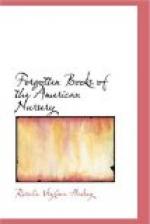“Whales in the Sea
God’s Voice obey.”
Proud parents thereafter heard their infants lisp:
“By Washington
Great deeds were done.”
For older pupils Noah Webster’s speller almost superseded Dilworth’s, and his “Little Readers’ Assistant” became the First Reader of many children. Webster as schoolmaster in a country district prepared this book for his own scholars. It was printed in Hartford in seventeen hundred and ninety, and contained a list of subjects suitable for farmers’ children:
I. A number of Stories mostly taken from
the history of
America, and adorned
with Cuts.
II. Rudiments of English Grammar.
III. The Federal Catechism, being a short and
easy explanation
of the Constitution
of the United States.
IV. General principles of Government and Commerce.
V. Farmers’ Catechism containing plain rules of husbandry.
Bennington, Vermont, contributed in “The Little Scholar’s Pretty Pocket Companion in Rhyme and Verse,” this indirect allusion to political affairs:
“’Twas a toy of royalty,
of late almost forgot,
’Tis said she represented
France
On English Monarchies arms,
But lately broke his chains
by chance
And widely spread alarms.”
But the most naive attempt to inculcate patriotism together with a lesson in obedience is found in “The Child’s Instructor,” published about seventeen hundred and ninety-one, and written by a Philadelphian. Philadelphia had become the residence of the President—a fact that may account for one of the stories in this book about an infant prodigy called Billy. “The child at five years of age was always good and obedient, and prone to make such a remark as, ’If you would be wise you must always attend to your vowels and consonants.’ When General Washington came to town Billy’s mama asked him to say a speech to the ladies, and he began, ’Americans! place constantly before your eyes, the deplorable scenes of your servitude, and the enchanting picture of your deliverance. Begin with the infant in his cradle; let the first word he lisps be Washington.’ The ladies were all delighted to hear Billy speak so well. One said he should be a lawyer, and another said he should be President of the United States. But Billy said he could not be either unless his mama gave him leave."[123-A]
Another Philadelphian attempted to embody political sentiment in “A Tale—The Political Balance; or, The Fate of Britain and America Compared.” This juvenile has long since disappeared, but it was advertised by its printer, Francis Bailey, in seventeen hundred and ninety-two, together with “The History of the Little Boy found under a Haycock,” and several other books for children. One year later a “History of the American Revolution” for children was also printed in Philadelphia for the generation who had been born since the war had ended. This was written in the Biblical phraseology introduced and made popular by Franklin in his famous “Parable against Persecution.”




